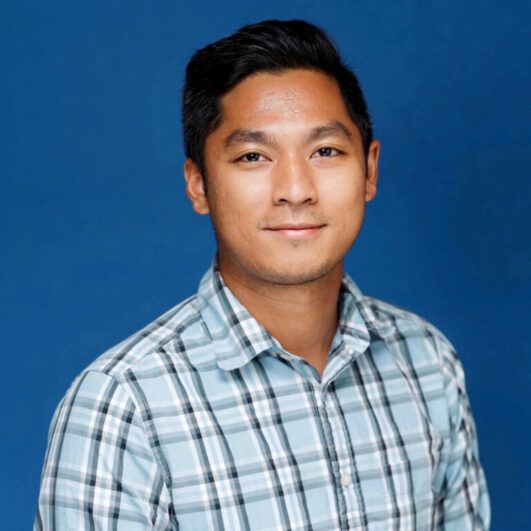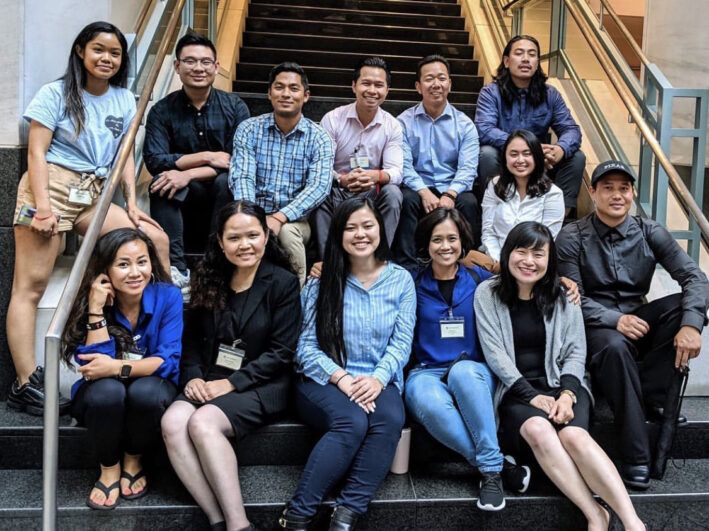By Raksmeymony “Rex” Yin

LGBTQ+ Pride Month follows Asian and Pacific Islander Heritage Month and Mental Health Awareness Month in May and comes before July’s Independence Day. In the midst of each, I reflect on the intersectionality of my identity as a 1.5-generation queer Cambodian American educator. This year’s Philadelphia Pride Parade will be my first pride event ever. I am not only showing up for myself; I am attending to be visible and demonstrate my intersectional freedom to be my authentic self.
Growing up, I did not witness success stories about the Cambodian community; instead, I was engulfed by narratives of pain and trauma. My family could detail their journey through the killing fields of Cambodia, surviving the refugee camps in Thailand, migrating to the United States, and overcoming myriads of cultural and social barriers. However, we are defined by so much more than just our pain. My family could also detail their joys of finding a Cambodian community safety net, having their own home and land to do gardening, and witnessing their children thrive.
Despite my family’s successes and joy, it is important to acknowledge the long term ramifications of war and genocide including post-traumatic stress disorder, depression, substance use, and many more mental health conditions that plague the Cambodian community.
I am reminded that the blood of resistance and self-determination flows through me. My family built a life that now includes numerous children finishing higher education, starting their own businesses, serving marginalized populations, and caring for the next generation. Despite my family’s successes and joy, it is important to acknowledge the long term ramifications of war and genocide including post-traumatic stress disorder, depression, substance use, and many more mental health conditions that plague the Cambodian community. Addressing the mental health stigma, ensuring culturally and linguistically responsive mental health services, and cultivating opportunities for intergenerational healing is an ongoing policy and advocacy priorities.

I brought my life experiences with me to SEARAC’s Leadership and Advocacy Training (LAT), aspiring to gain the tools and knowledge to continue the fight for freedom for the Southeast Asian American community. At LAT, comrades and changemakers surrounded me in a shared effort to create a more equitable society. We honed our skills so that we could return to our respective communities better equipped to dismantle inequities and to create community-centric goals. A memorable moment I had with the education policy team and my LAT mentor is realizing that my personal narrative and lived experiences has just as much weight, if not more, than statistics when it comes to identifying policy priorities and agenda-setting items. I learned to lean into my identity as my strength so policymakers knew that it was an asset.
I am realizing that progress in the Southeast Asian LGBTQ+ community’s fight for freedom and liberation means having an awareness of the inequities, building a collective vision of solidarity, and uplifting the intersectionality of our humanity.
As an adult, I notice that in professional and community spaces I am advocating for interwoven solutions. In Asian American, Pacific Islander, and/or Native Hawaiian (AANHPI) spaces, I am advocating for disaggregating and making visible the diverse lived experiences of AANHPI communities. In mental and social services dialogues, I am advocating for culturally and generationally sensitive services. With my LGBTQ+ peers, I advocate for healing-centered spaces and authentic expression of one’s identity. I am realizing that progress in the Southeast Asian LGBTQ+ community’s fight for freedom and liberation means having an awareness of the inequities, building a collective vision of solidarity, and uplifting the intersectionality of our humanity.
In my own journey, I am constantly reminding myself of those who paved the path and fought for our freedom. I carry my family’s narratives of survival and the human right to live at our utmost potential. When I march at Pride, what I hope to think about is that freedom is our fight for visibility, equity, and liberation.
Raksmeymony “Rex” Yin is a 1.5-generation Cambodian American queer educator passionate about education equity, social equality, and community healing. He approaches his work with critical consciousness of his personal experiences, community narratives, intersectionality framework, and ecological systems theory. Rex provides diversity, equity, inclusion, and belonging quality supports to Philadelphia’s city-funded early childhood education program. He also serves on the boards of the Cambodian Association of Greater Philadelphia, Philadelphia Asian & Queer, the Asian Mosaic Fund, and Mifflin Square Neighborhood Coalition. He has a B.A. in Educational Research from Gettysburg College, M.Ed in Curriculum & Instruction – Early Childhood Education emphasis from Eastern University, and is currently pursuing a Masters in Public Policy at Temple University.
